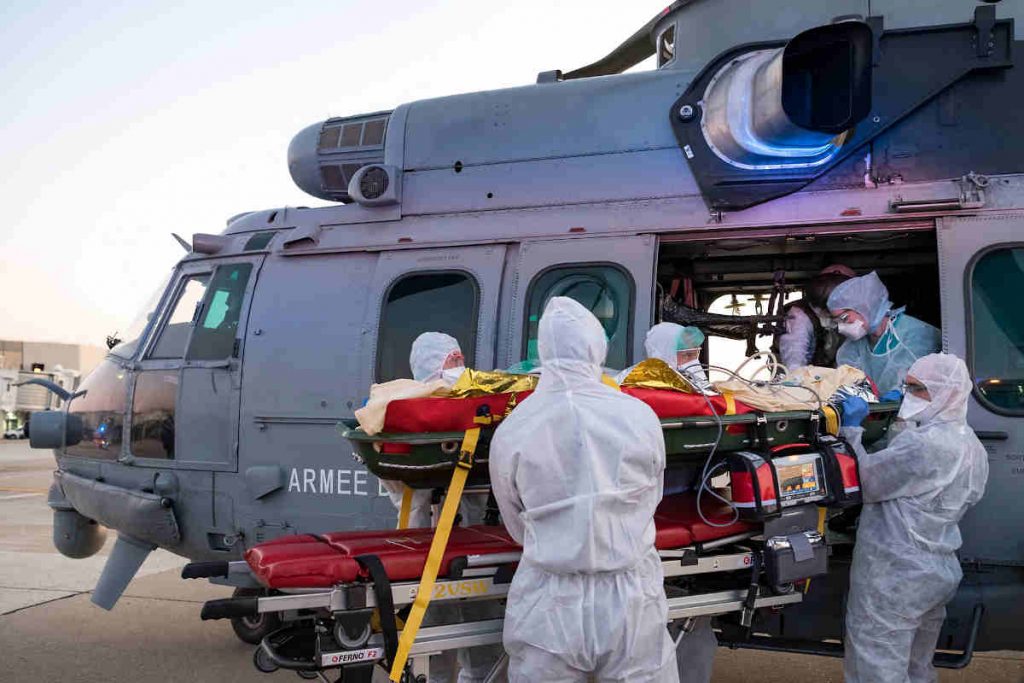
News
EMS
Airbus Helicopters outlines support, options for operations on COVID-19 frontline
April 23, 2020 By Helicopters Staff
 On April 1, 2020, two Caracals from BA 120 in Cazaux were used to transport Covid-19 patients from Ile-de-France as part of Opération Résilience. (Photo: Armee de l'air)
On April 1, 2020, two Caracals from BA 120 in Cazaux were used to transport Covid-19 patients from Ile-de-France as part of Opération Résilience. (Photo: Armee de l'air) Airbus Helicopters on April 20 released some of the details behind its support of its customer operations who are on the front line of the COVID-19 pandemic. This includes emergency medical services (EMS), para-public and military rotary-wing operations helping hospitals and governments to provide air medical transport and other critical services.
Airbus’ support ranges from ensuring the availability rate of varied French SAMU aircraft stay at almost 100 percent and adapting cabin interiors to analyzing helicopter ventilation systems and proper disinfection of the machines.
A large part of the support effort from Airbus Helicopters involves mobilizing its teams to inform operators of new and existing solutions for separating the cockpit from the cabin. “Many EMS operators and militaries are transporting COVID-19 patients while lacking the means to isolate the cockpit from the cabin to protect the crew,” said Stefan Bestle, EMS marketing manager at Airbus Helicopters. “But a solution exists for certain aircraft in the form of cabin cockpit isolation, which provides a barrier between the infected or possibly infected patients and the flight crews, thereby increasing the level of protection.”
Airbus explains it has already identified and communicated cockpit-cabin-separation options available in local markets for the H135/H145, as well as the AS332/H225 fleet. Additional solutions for AS365/H155/H175 are under final approval and will be included in the next days. Solutions for the intermediate single engine helicopters are currently under exploration, explains Airbus, and it has also communicated technical information concerning the ventilation, heating and air conditioning systems on Airbus helicopters. (Information Notice 3492-I-25 accessible via AirbusWorld or T.I.P.I.)
In addition, Airbus Helicopters has issued guidance about how to properly clean and disinfect helicopters, workspaces and tools that have been contaminated by COVID-19, including processes to be followed and disinfection material to be used. (Information Notice 3476-I-12 accessible via AirbusWorld or T.I.P.I.)
Airbus Helicopters is also addressing the training gap created by social-distancing measures with new theoretical courses – non-practical – available to both pilots and technicians. “These remote courses replace classroom trainings and are adapted to a virtual environment with specific software, a different pedagogical approach, and dedicated instructor training,” said Sabrina Barbera, head of training at Airbus Helicopters.
Airbus explains that in order to support NH90 operators worldwide, such as the French and Spanish armies, Italian Navy, but also the Australian Ministry of Defence, and the Royal Air Force of Oman, the NH90 Program support office has mobilized, together with NHI and its partner companies Leonardo and Fokker, to ensure the delivery of spare parts, faster turnaround times for repairs, the development and deployment of new solutions such cabin isolation or disinfection among other measures.
To supplement Airbus Helicopters staff already working on customer bases like in Sweden, Australia, New Zealand and Finland, the company is also dispatching teams to perform aircraft and/or component repairs at customer premises in order to prevent AOGs and increase reactivity and responsiveness.
The Airbus team at the Military Support Centre in France (MSCF) has been supporting the French armed forces and the French Ministry of Interior by providing the means to fulfill their critical missions, ranging from EMS and public services to logistics flights.
The MSCF was one of the first areas to restart production activities after a four-day pause mid-March, explains Airbus, which allowed it to implement the most stringent health and safety measures to protect the employees. The teams at MSCF created their own protection visors, an initiative that has since been implemented in other production zones at the Marignane site.
“The French armed forces have been on the frontline from the beginning of the COVID-19 crisis, performing critical missions such as transporting COVID-19 patients to other hospitals for treatment. Helicopters have played an essential role in these missions, and we, at the Military Support Centre in France, are here to support them,” said Olivier Tillier, head of the Military Support Centre in France. “This includes responding to urgent demands to deliver spare parts, and finishing up scheduled maintenance work to deliver helicopters faster.”
Airbus notes the MSCF has been assisting the French armed forces with “Operation Résilience” with tasks ranging from dispatching equipment and supplies to disinfect their helicopters, extending scheduled maintenance tasks, adapting spare parts deliveries, maintaining personnel at the bases, and finalizing maintenance or retrofit work to enable Cougars, EC145s, Caracals, Pumas, and NH90s to be put back into flight or to continue flying.